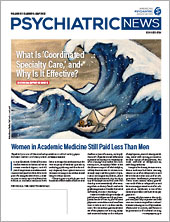In early April, a Texas appeals court reinstated a district court injunction blocking the state of Texas from investigating gender-affirming care as child abuse. After that decision, Texas filed an appeal to the Texas Supreme Court, and APA signed on to an amicus brief in support of the plaintiffs. The brief is substantively similar to briefs that APA had filed in earlier stages of the case.
The rulings stem from a nonbinding opinion issued in late February by Texas Attorney General Ken Paxton stating that gender-affirming care of children, such as surgical interventions or puberty-suppressing drugs, “can legally constitute child abuse” under Texas law. The next day, Texas Gov. Greg Abbott sent a letter to the Texas Department of Family and Protective Services (DFPS), which is responsible for investigating charges of child abuse.
“Texas law … imposes a duty on DFPS to investigate the parents of a child who is subjected to these abusive gender-transitioning procedures,” he wrote. The same day, DFPS announced that it would comply with Abbott’s letter and commence investigations of families of transgender youth.
The medical treatments that Abbott claims are child abuse “are part of the widely-accepted treatment guidelines for adolescents suffering from gender dysphoria, and are supported by the best available scientific evidence,” wrote APA and more than 20 additional physician organizations, including the AMA and the American Academy of Pediatrics, in the amicus brief. “Denying these treatments to adolescents who need them would irreparably harm their health.”
The lawsuit against the governor’s ban was filed by the American Civil Liberties Union (ACLU), the ACLU of Texas, and Lambda Legal on behalf of Jane and John Doe, the parents of a 16-year-old transgender girl identified as Mary Doe. The suit claims that, three days after Abbott sent his letter, a child protective services worker visited the Doe family, telling the parents that the sole allegation against them is that they have a transgender child who is “currently transitioning from male to female.”
Jane Doe is a DFPS employee. “We are terrified for Mary’s health and well-being, and for our family. I feel betrayed by my state and the agency for whom I work,” Jane Doe wrote in a declaration filed with the lawsuit. (APA has also signed an amicus brief in a case involving an Arkansas law that bans gender-affirming therapy (
Psychiatric News.)
On March 11, a Texas judge issued an injunction in the case, blocking the state from investigating the parents of transgender youth at least until after a trial that is set to begin in July. Shortly after the judge issued the injunction, Paxton appealed the decision, and APA refiled its amicus brief with the appeals court.
Texas Directive Harmful, Says APA
APA and its partner organizations issued a statement shortly after Abbott issued the directive to DFPS. “All patients must have access to evidence-based health care, regardless of their gender identity or sexual orientation,” the statement by the Group of Six reads. “Our organizations will not stand for any efforts that discriminate against transgender and gender-diverse individuals and cause harm to their health and well-being.”
The Group of Six includes APA, the American Academy of Family Physicians, the American Academy of Pediatrics, the American College of Obstetricians and Gynecologists, the American College of Physicians, and the American Osteopathic Association.
“This directive will create a climate of fear that will cause conflicts within families who aren’t able to support their children’s identities.”—Gabrielle Shapiro, M.D.
“The impact of this directive is going to be disastrous,” said Gabrielle Shapiro, M.D., chair of APA’s Council on Children, Adolescents, and Their Families and clinical professor of psychiatry at the Icahn School of Medicine at Mount Sinai. “Families with means will be able to move out of Texas, or take their children to another state for treatment, but socioeconomically disadvantaged families don’t have those options,” she said. She pointed out that the directive will especially impact immigrant families in Texas, who may avoid treatment for their children due to fears of how a child protective services investigation may affect their immigration status. “Children will go untreated, and adolescents will experience untreated depression and anxiety. This directive will create a climate of fear that will cause conflicts within families who aren’t able to support their children’s identities.”
The directive has already had significant impacts on transgender youth throughout the state. Texas Children’s Hospital, the country’s largest pediatric hospital, stopped prescribing gender-affirming hormone therapies. The Washington Post reported on March 8 that the hospital had said in a statement that the decision was made “to safeguard our health care professionals and impacted families from potential legal ramifications.” On March 1 The New York Times reported that, according to the parent of a transgender teenager in Houston, a local health clinic suspended all prescription medications for transgender minors. District attorneys in some of Texas’s most populous counties, however, have stated they will not prosecute anyone under the directive, which they called “un-American.”
Texas Physicians in Untenable Position
In his letter to DFPS, Abbott specified that Texas law includes reporting requirements for all licensed professionals who have direct contact with children “who may be subject to such abuse,” including doctors and nurses. The law also “provides criminal penalties for failure to report such abuse,” Abbott wrote.
The directive puts health care professionals in Texas “in an impossible position,” APA and the other organizations wrote in the amicus brief. “These providers are required to falsely report adolescent patients receiving these treatments as victims of child abuse even though such reporting would inflict serious harm on their patients, thereby violating these providers’ professional codes of ethics. On the other hand, if these providers do not report their patients, they face severe legal consequences, including potential civil and criminal penalties and the loss of their professional licenses.”
The physician’s relationship with patients and families is private, and compromising that relationship is an affront to the Hippocratic oath, Shapiro said. “I imagine we will see an exodus of child and adolescent psychiatrists, as well as pediatricians, from the state, which already has a shortage of child and adolescent psychiatrists,” Shapiro said.
In a statement, U.S. Department of Health and Human Services (HHS) Secretary Xavier Becerra called Abbott’s actions “dangerous to the health of transgender youth in Texas.” HHS took several actions in response to Abbott’s directive, including releasing guidance to state child welfare agencies through an information memorandum that makes clear that states should use their child welfare systems to advance safety and support for LGBTQ youth, including ensuring access to gender-affirming care. HHS also released guidance on patient privacy, clarifying that physicians in Texas are not required to disclose private patient information, as well as guidance emphasizing that denying health care based on gender identity is illegal.
Shapiro encouraged physicians to be proactive in speaking to families who may be impacted, and to have honest conversations about how they can support their children through advocacy.
“These children and families feel they have no voice, and we need to empower them so that they know they do have voices and that we can all work together to combat this discriminatory policy.” ■
The amicus brief is posted
here.
“Physicians Oppose Texas Efforts to Interfere in the Patient-Physician Relationship and Criminalize Gender-Affirming Care” is posted
here.
“Statement by HHS Secretary Xavier Becerra Reaffirming HHS Support and Protection for LGBTQI+ Children and Youth” is posted
here.
The
Doe v. Abbott lawsuit is posted
here.

